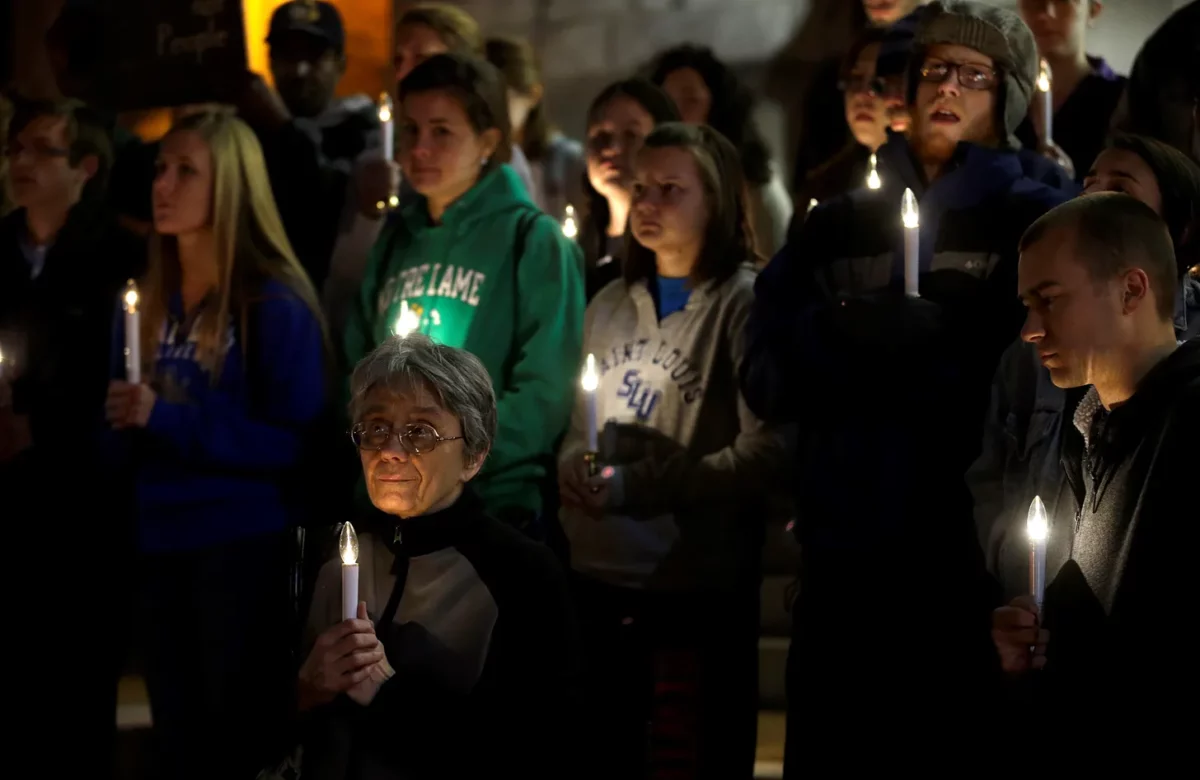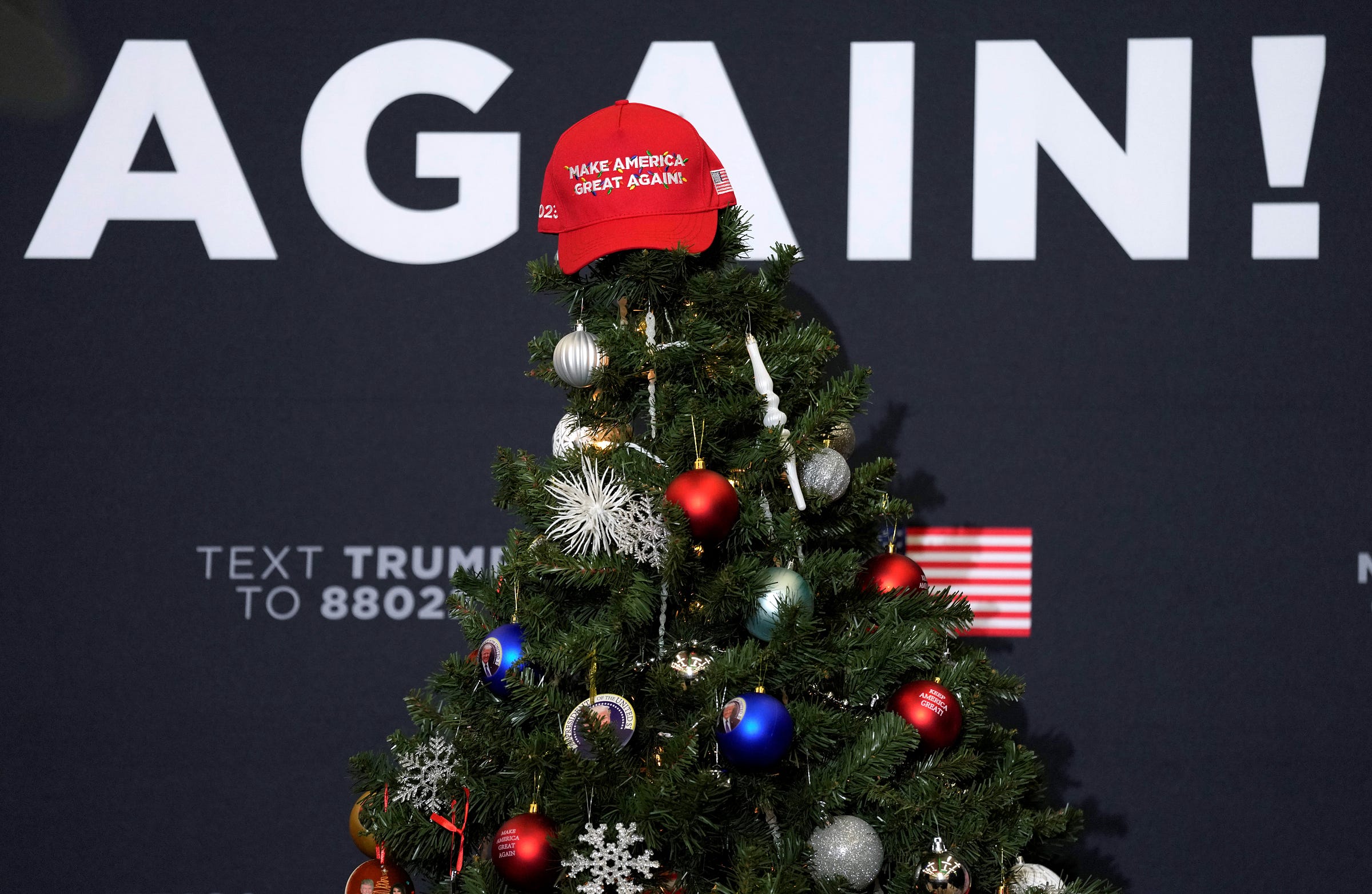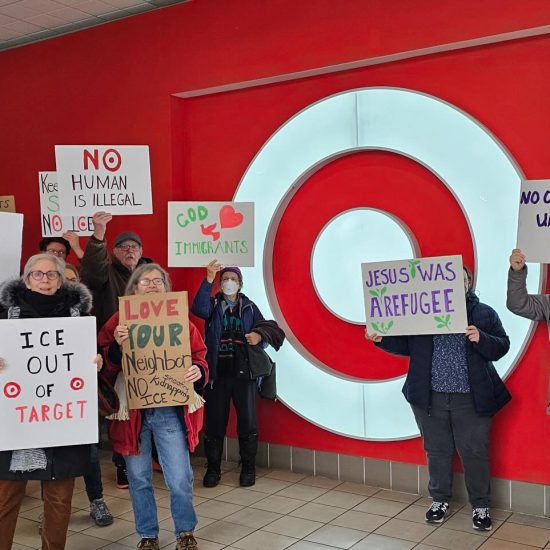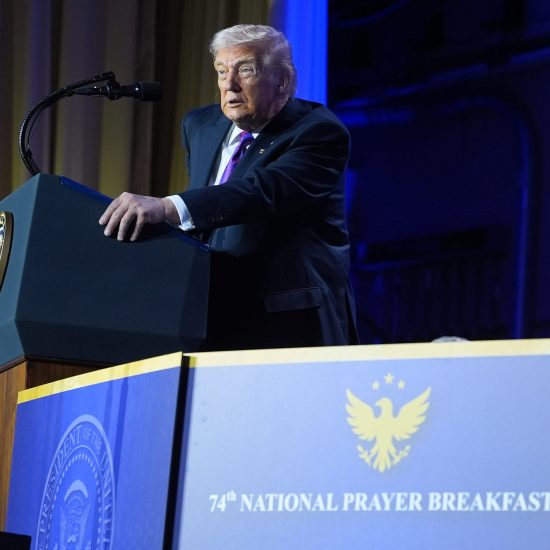
Four days after a family in Lexington, Kentucky, put up their Christmas tree inside their house and decorated it, they discovered an owl living inside it. Not quite a partridge in a pear tree, but still pretty wild. Of course, cutting down and taking an owl’s home is pretty fowl. Especially so close to the holidays.
The family and their three non-bird dogs didn’t even notice the creature staring at them. Instead, a guy who showed up to clean the carpet saw the tree move and decided to wing it as pet detective, tracking it down and taking photos. Talk about a head-turning discovery! After giving the bird pics to the family, he asked if he should shoo the hoo. The family got quite a hoot out of the news, but was also happy the carpet guy was there to take care of it. That might make for an unusual itemized bill — as well as a unique throw rug.
“Everybody’s going to be able to have a merry Christmas now,” the carpet cleaner-turned-bird catcher said, apparently ignoring the unmerry plight of the homeless owl.
Aside from offering a good case for getting an artificial Christmas tree, the true story this week that has us singing “Owl Christmas Tree” is quite the metaphor for missing something significant behind the twinkling lights and tinsel. It’s easy this time of year to focus on the decorations and ignore what’s happening owl around us.
That’s why we’ve been offering our third annual set of Unsettling Advent devotionals. Each year, 20+ writers help us reflect on how the news of the year helped us better understand the biblical stories. In 2021, writers considered Advent in a time of death/COVID, in a time of racial injustices, and in a time of insurrection. And last year, writers considered Advent in a time of war (in Ukraine), in a time of refugees, and in a time of (gun) violence.
This year, we decided to once again unsettle Advent in light of our unsettling world. And we have been amazed by the devotionals. They have helped us think in fresh ways about the old, old story we thought we knew so well. Writers have been reflecting on Advent in a time of state executions, in a time of political anxieties, and in a time of bloodshed in Israel.
We know that many of you have joined us on this journey. But in this issue of A Public Witness, we want to share some of what we’ve learned from Unsettling Advent this year. We hope these insights will be meaningful in these last few days before we celebrate the Savior of all creation (even stowaway owls).
Help sustain the journalism of Word&Way by subscribing to A Public Witness!
Advent in a Time of State Executions
One aspect of the Christmas story that often gets glossed over is King Herod ordering the execution of children. We all know it happened — we just don’t tend to want to reflect on what it could mean. And these weren’t even the only executions Herod oversaw as he sought to stay in power, including killing members of his own family.
This year has seen echoes of Herod’s morality tale as the U.S. is having its busiest capital punishment year since 2018. However, there has been one major change since then: the Supreme Court recently ruled that states must allow spiritual advisors to be present and able to touch condemned people during executions.
One of the spiritual advisors who experienced this firsthand in 2023 was Rev. Lauren Bennett, the provisional senior pastor at Metropolitan Community Church of Greater St. Louis. She wrote for her devotional: “Honestly, I have not been looking forward to Advent this year. It feels like too much to ask my soul to long for a world without Herods when there are so many.”
But there is also a note of hope here, she reminded us, because “faith doesn’t require us to embrace empty promises, easy answers, or half-truths. It does however require us to bring softness to hard places and open ourselves to meet Jesus in unlikely faces.”

A group of death penalty opponents stand outside St. Francis Xavier Church during a vigil to protest the death penalty and the scheduled execution of Joseph Paul Franklin on Nov. 19, 2013, in St. Louis, Missouri. (Jeff Roberson/Associated Press)
Rev. Melissa Bowers, an ordained pastor and hospice chaplain, went through a similar experience as a spiritual advisor. She wrote, “Kindness will not be warmly invited into cold, dark places. Healing will not be offered a red carpet on which to royally process into sick and hurting places. Compassion will not be eagerly embraced and escorted into chambers of evil, hostility, and revenge.” Therefore it is our job to “make the paths smooth and the way straight for the Light of the world — the Light that does not chase away darkness but eliminates it with its overwhelming grace.”
Another death row spiritual advisor, Rev. Dr. Jeff Hood, reflected on what this powerful experience has meant for him: “There is nothing pure about this process. It ensnares us all. We all become a little less human every time it happens. Even those of us who have dedicated our lives to ending the death penalty are not left out.”
“I guess that’s the only way that this heinous practice is going to stop,” he added. “We must all feel the burden of our own participation.”
We also heard from those working outside the system to end the death penalty, such as Rev. Carlos L. Malavé, a Presbyterian pastor and the president of the Latino Christian National Network. He wrote that “too many of us have come to believe the lie that the way to end violence is with more violence. We believe that the very act of killing, applying the death penalty, is a way of teaching us to value life.”
But, he added, “the spirit of Advent shows us an alternate reality, God’s reality.” It is here that the religious imagination can manifest peace and love and show us “a different way of confronting evil, pain, and even death.”
Advent in a Time of Political Anxieties
It is probably fair to say that we have all experienced some form of anxiety in 2023. And while there are a number of reasons for this, the unrelenting political turmoil in our nation and around the world likely played a part. One tool that can help us cope with our present circumstances is perspective. Our climate of uncertainty is not unlike the world that Jesus was born into.
Rev. Kristel Clayville, a religion scholar and former hospital chaplain, reflected on how her experiences doing archaeology in Israel influence how she thinks about our current moment. She wrote, “On site, the head archaeologist would often say, ‘People don’t get up one morning, find out there’s a new ruler, and decide to stop eating Cheerios for breakfast.’” While Clayville thought this was funny and seemed to make sense at the time, she has come to question it.
“I haven’t changed what I eat for breakfast (yet), but I’ve changed how I teach and where I travel … I worry about my access to healthcare when election season rolls around. I worry about the legal status of my marriage in the coming years,” she wrote. “Changes in our political leadership do trickle down to my everyday decisions, and I don’t think I’m alone in this.”
Advent reminds us that Jesus presented a direct challenge to how everyday people are impacted by those in power.
Dr. Samuel Perry, a professor of sociology at the University of Oklahoma, reflected on how there are healthy and unhealthy ways to engage in such political work: “We find that perfect example in Jesus’s incarnation, the ultimate example of embodied politics. By this I mean fully-invested, physical participation in the transformation of our spiritual, social, and physical world.”
However, we often see two prominent forms of politics competing with this: spending hours consuming national news and doom-scrolling or fighting with strangers online (disembodied politics) or attempts to coerce people to conform to an ethno-cultural vision of purity (the misembodied politics of Christian Nationalism).

A Make America Great Again hat sits on top of a Christmas tree during a former President Donald Trump rally on Dec. 19, 2023, in Waterloo, Iowa. (Charlie Neibergall/Associated Press)
A far more effective way to enact political transformation, Perry noted, “involves in-person conversations, acts of service, and building relationships. It’s often small-scale and painfully slow. But in the process, real love is shown to one’s neighbors and community, you might even say that ‘love is incarnated.’ This is the politics of Advent, the politics of Jesus.”
Rev. Janna Louie of the Baptist Joint Committee for Religious Liberty wrote about how Psalm 80 also invites us into a different posture in advocacy: “Anxieties are transformed by their collective grief and lament.”
“If you find yourself anxious, hopeless, and weary this Advent, join the chorus of lament,” she added. “To embrace our grief, lament, and anger, we must embrace our powerlessness … and engage the world around [us], no matter how tough it gets. May our collective song of lament sustain us in this work of hope.”
Successfully accomplishing this without burning out is no easy task. Rev. Nathan Empsall of Faithful America had this in mind when he wrote, “We begin to calm our anxieties only when we learn to accept the presence of divine mystery in our lives.”
“If we act without pausing to rest, reflect, and wonder, we’ll miss the chance to sit still in the presence of God,” he added. “We defeat anxiety by choosing to spend time dwelling in mystery alongside Emmanuel in the manger: alongside God with us.”
Help sustain the ministry of Word&Way by subscribing to A Public Witness!
Advent in a Time of Bloodshed in Israel
We started planning our themes for this year near the beginning of October so we could find good writers and give them plenty of time to work on their devotionals. We decided then that one week should look at Advent in a time of unrest in Israel. A new rightwing government was adopting extremist policies and inspiring religious extremists. Israeli church leaders had been complaining about a rise in anti-Christian incidents, and the death toll of Palestinians was the highest in nearly two decades.
Then came Oct. 7.
The deadly terrorist attacks by Hamas and the Israeli government’s massive retaliation not only meant we couldn’t ignore this issue but we also shifted the theme from thinking about unrest and protests to war and genocide. The writers this week have been helping us process the ongoing news in light of the death and even hope found in the original Christmas stories.
“Jesus was born into a dark time,” Rev. Mae Elise Cannon, executive director of Churches for Middle East Peace, wrote. “The first century was marked with brutality, terror, tyranny, and greed. Even the ruler of the day, Herod the Great, was so threatened by the possibility of the birth of the Messiah that he ordered all innocents under the age of two years old in Bethlehem to be killed. We are told there was weeping and great mourning. This description could describe the reality for many in the Holy Land today.”
Yet, even with that violence and mourning, she noted that “the hope that we profess this Advent season is that the love of God and the light of the world through Jesus is made known.” Then and now.
Helping us reflect this week on Advent in light of the war in Israel and Gaza have been Palestinian Christians. Rev. Alex Awad, a retired minister who served as pastor at East Jerusalem Baptist Church and a professor at Bethlehem Bible College, reflected on leading an American tour group as news of the Oct. 7 attacks emerged. They continued that day toward their visit of Herodium, where King Herod built a castle and is buried.
“As we visited the palace of this great liar, deceiver, and mass murderer, little did we know that in the next two months we would watch news of Herod-like-leaders commit atrocities on the civilians of Gaza, leading to the death of over 8,000 children,” Awad reflected. “Other world leaders — both directly and indirectly — lent a hand in the massacre of over 18,000 men, women, and children in Gaza.”
Yet, he still finds hope. Herod’s bloodshed failed to stop the Prince of Peace, thus reminding us “light is more powerful than darkness, and life is more powerful than death.”

Graffiti by Bansky on the Israeli separation wall in Bethlehem showing an Israeli soldier stopping a donkey at a checkpoint. (Roger Garfield/Alamy)
Similarly, Dr. Rula Khoury Mansour sees “echoes of despair and grief” in today’s war and the time of Jesus’s birth in that land. A professor at Nazareth Evangelical College and the founder and director of the Nazareth Center for Peace Studies, she reminded us that Jesus is still here in situations like this.
“Jesus, who came to be present with us, walks with the oppressed, the marginalized, the sick, the children, and the outcasts,” Mansour wrote. “Christmas reminds us it is precisely in the midst of the darkness of hatred that it is time for love to be born.”
Rev. Hanna Massad, who grew up in Gaza and is a former pastor of Gaza Baptist Church, noted the parallels between the plight of Mary and Joseph to Egypt and that of Gazans today. However, he pointed out that while the holy family “had a destination, Egypt, where they could find refuge,” closed borders and missiles raining down mean “the people in Gaza today have no such sanctuary within their besieged land.”
In his devotional, Massad alluded to his own previous flight from Gaza amid persecution and he quoted from a member of his former congregation seeking comfort in Jesus amid this war. As we prepare to celebrate Christmas, he urged us to “extend that hope and refuge to those in need, just as Mary and Joseph found refuge in Egypt.”
Get cutting-edge reporting and analysis like this in your inbox every week by subscribing today!
The Hope of Peace
We know our devotionals aren’t the happiest ones you can read. But while everything isn’t jolly and bright the reflections, that doesn’t leave us without hope. It’s only by being honest about the challenges facing our world that we can become clear-eyed about our need for God to be with us anew.
Unsettling Advent is about disturbing our comfortable assumptions and routines so that we might become more faithful followers of the Savior we herald as the true Prince of Peace. Rather than accept a tamed version of the gospel, we sought to find prophetic voices who could remind us about the radical implications of that first Christmas.
We pray these various voices will prepare your hearts not for the sentimental world of Hallmark movies but for the very real world in need of the peace proclaimed by the angelic host.
As a public witness,
Brian Kaylor & Jeremy Fuzy






